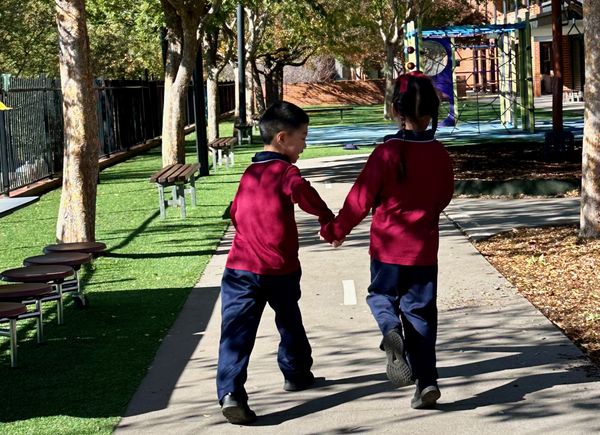Cultivating contextual wellbeing
Cultivating contextual wellbeing
By Ms Karen Mahar, Interim Deputy Principal, Head of Junior School
As we navigate the intricate landscape of growing well rounded young people that are prepared to take their place and make a difference in an ever-changing world, it's critical to consider not only our immediate goals but also the long-term outcomes for our children's development.
One important aspect we’ve been reflecting on, and which deserves closer scrutiny, is how we motivate our children. Especially our reliance on external motivation and extrinsic rewards to encourage and shape behaviour for the better.
Earlier in 2024, Dr Helen Street urged our teaching teams to rethink our approach to student wellbeing and motivation.
Dr Street defines contextual wellbeing as "a state of health, belonging and positive engagement in life that arises from membership of an equitable, inclusive and cohesive environment.” This concept suggests that true fulfilment emerges not just from individual achievements, but from the quality of our connections and interactions within our learning and social context.
Central to contextual wellbeing are three key needs: belonging, engagement, and autonomy. These needs, outlined in Professor Richard Ryan and Edward Deci's Self-Determination Theory (SDT) are the cornerstones of autonomous motivation and self-determination. When these needs are met, individuals are more likely to experience a sense of wholeness and purpose in their lives.
Belonging, the first of these needs, speaks to our innate desire for connection and community. It's through our relationships that we find validation, support, and a sense of identity.
Similarly, engagement encompasses our need for challenge, growth and competence. When we're actively involved in tasks that stretch our abilities, we experience a profound sense of fulfilment and accomplishment.
Lastly, autonomy represents our need for agency and self-expression. When we have the freedom to make choices aligned with our values and interests, we feel empowered and alive.
When these needs are met, individuals feel fulfilled and connected. However, in a world where external validation often overshadows intrinsic motivation, we must reconsider our reliance on rewards and punishments.
So, what does this mean for our practices at the College and in parenting?
It suggests that it is wise for our focus to shift away from the use of external rewards and punishments to one of cultivating environments that nurture intrinsic motivation and contextual wellbeing in our children.
Instead of offering material incentives for desired behaviours, we can foster a sense of belonging by creating inclusive learning cultures where each student feels valued and heard. We can promote engagement by providing opportunities for meaningful learning and exploration.
In a world where social media validation is rampant and there is growing pressure to project an idealised image of reality, we also challenge the notion of giving every child a ribbon or trophy for participation.
There is a common belief that awards and rewards consistently drive increased effort and behaviour. However, is this always the case?
Believe it or not, words of praise can hamper both a child's motivation, as well as their creativity. We sometimes create praise junkies, unwilling to try anything without our approval – Dr Justin Coulson - Happy Families
While words of praise, rewards, awards and certificates can boost short term motivation, they can also often dampen intrinsic motivation. When a teacher offers a reward for completing a task that is already expected, award someone for behaviour that is already usual, it can diminish the student's inherent interest or motivations. This phenomenon is known as the ‘over justification effect’. It challenges the wisdom of using rewards in educational settings. If not employed thoughtfully, rewards may inadvertently undermine motivation rather than enhance it.
At our Junior School, we've discontinued formal certificates and end of year awards in favour of fostering a sense of inclusion, belonging and intrinsic motivation. Instead of focusing on achievements, we acknowledge effort, the learner profile and character strengths during our "Shout Outs" sessions.
During "Shout Outs," one or two students from each class are recognised and acknowledged. Sometimes, we highlight specific Learner Profiles, while other times we acknowledge character strengths that have been demonstrated. Our focus is primarily on effort rather than achievement. We believe these “Shout Outs” are an authentic way for our students to feel seen, heard, and valued in their community.
By prioritising connection, growth, and autonomy, we lay the foundation for our children to lead fulfilling and purpose-driven lives. As a community, let's embrace the challenge of nurturing intrinsic motivation and contextual wellbeing in our children, knowing that true fulfilment comes from within, not from external validation.
References:
No ribbons, no certificates — schools go reward-free to tackle the 'bubble-wrap' generation
Rewards, praise, and punitive consequences: Relations with intrinsic and extrinsic motivation
Extrinsic Rewards Undermine Motivation in the Classroom . . . Sometimes
Self-Determination Theory and the Facilitation of Intrinsic Motivation, Social Development, and Well-Being
Happy Families Family Education
